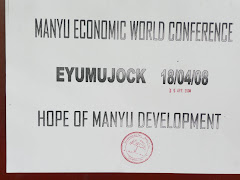
Whereas striving to become independently wealthy is the American dream, being self employed can be termed an American destiny. Almost 70% of all U.S. business revenue is accounted for by small business. They also account for half of the private workforce and national output. Small businesses fill niche markets, boast competition, provide market innovation, and offer an opportunity to create wealth.
Every day the opportunities for self employment grow but in most Africans economies, the primary source of employment is government first and business second. The idea of of running your own business although varied and enticing is often a challenge to many. For one thing, governments in Africa make it so difficult to set up a business. The bureaucracy and upfront taxes are a compounding nightmare. Despite these roadblocks, a few daring Africans venture into small business and eventually succeed. Ideally, if you want to run a business and become an entrepreneur, you must have a passion – passion for your product or service, passion for day to day rewards and challenges of being your own boss and dealing with a diverse and demanding clientele.
 For some people, the decision to start a business may be based on factors such as the need to make a living, work at your own pace, do something after retirement or simply own a business and make lots of money. To begin with, the aspiring African entrepreneur needs to firstly identify what motivates him or her. For some people, the fear of starting a business is a willingness to take risks. By taking risks, it implies working in an environment that allows you to try out new approaches that are distinctively yours. It also implies taking an approach that goes beyond conventional practice; the risk taker believes he or she can provide a service or product that can not only compete with others but goes above that which others offer.
For some people, the decision to start a business may be based on factors such as the need to make a living, work at your own pace, do something after retirement or simply own a business and make lots of money. To begin with, the aspiring African entrepreneur needs to firstly identify what motivates him or her. For some people, the fear of starting a business is a willingness to take risks. By taking risks, it implies working in an environment that allows you to try out new approaches that are distinctively yours. It also implies taking an approach that goes beyond conventional practice; the risk taker believes he or she can provide a service or product that can not only compete with others but goes above that which others offer.Quite often when one visits Africa and meets a relative or friend, the first thing they demand is money to start a business. The next question one tends to ask; what type of business and how much do you need. Without any serious thought, the casual response is - I just wish to start something and any amount will do. What this indicates is that the prospective entrepreneur does not have a business plan, and there is every indication the business will fail. Sometimes we meet friends or family who were in business and after a year, they tell stories of failure. On careful examination and analysis you later discover, they did not spend much time managing the business and hired relatives who instead helped to run it down. We are therefore left to ponder, why do some small businesses in Africa stumble so fast?
 At some time in the life of a business, most will experience failure due to over taxation from the government or loose financial controls. Besides arbitrary tax policies that stifle growth, most of the prevailing reasons small business fail in Africa are poor management, insufficient capital, poor location, and lack of planning and in some cases expanding too quickly. Most new business owners in Africa frequently lack the relevant business and management expertise. They tend to lack the expertise in hiring and managing employees, finance and book keeping. Because small business owners in Africa tend to hire relatives, they are not alert to fraud until the situation becomes uncontrollable. These individuals neglect their business and forget to take regular care to study, plan, organize and control all activities of the operation. Due to the excitement and anxiety in owing a business, the African entrepreneur fails to ascertain how much the business will need not only in startup cost, but operating cost. The reason is business takes about a year or two to get off the ground and therefore enough funds are needed to cover all initial cost for those early years.
At some time in the life of a business, most will experience failure due to over taxation from the government or loose financial controls. Besides arbitrary tax policies that stifle growth, most of the prevailing reasons small business fail in Africa are poor management, insufficient capital, poor location, and lack of planning and in some cases expanding too quickly. Most new business owners in Africa frequently lack the relevant business and management expertise. They tend to lack the expertise in hiring and managing employees, finance and book keeping. Because small business owners in Africa tend to hire relatives, they are not alert to fraud until the situation becomes uncontrollable. These individuals neglect their business and forget to take regular care to study, plan, organize and control all activities of the operation. Due to the excitement and anxiety in owing a business, the African entrepreneur fails to ascertain how much the business will need not only in startup cost, but operating cost. The reason is business takes about a year or two to get off the ground and therefore enough funds are needed to cover all initial cost for those early years.Lack of business planning is common amongst Africans wishing to get into business, having a business plan is critical in setting goals. Most start up entrepreneurs are so fast to get the business running and neglect to write down their business plan. In essence, your business plan should include a detail outline that evaluates the economic viability of your business. Since a business plan is the roadmap to chart the course of the business and eventual success, it must outline your business purpose, goals, profile and economic assessment.
 According to the U.S. small business administration, (SBA), you will have a better chance of entrepreneurial success if you have a passion for what you will be doing and believe your product or service will fulfill a need in the marketplace. Besides possessing a mental stamina to withstand potential challenges, success comes with having a drive, determination, patience and a positive attitude. Eventually, you will make mistakes and have failures, however do not defeat yourself by building on failures. Every small business man must strive on independence and be skilled at taking charge when a creative solution is needed. The successful entrepreneur has to be compassionate, provide good customer service, like your fellow man, show honesty and integrity when interacting with others.
According to the U.S. small business administration, (SBA), you will have a better chance of entrepreneurial success if you have a passion for what you will be doing and believe your product or service will fulfill a need in the marketplace. Besides possessing a mental stamina to withstand potential challenges, success comes with having a drive, determination, patience and a positive attitude. Eventually, you will make mistakes and have failures, however do not defeat yourself by building on failures. Every small business man must strive on independence and be skilled at taking charge when a creative solution is needed. The successful entrepreneur has to be compassionate, provide good customer service, like your fellow man, show honesty and integrity when interacting with others.Ultimately, everyone is drawn into business to create wealth and become wealthy. The reality is the African entrepreneur has a stepper hill to climb. African governments must realize as the U.S. did a long time ago that small businesses are the drivers of any striving economy. Small businesses hire more people than the government and if allowed to operate in a free market where competition reins, will contribute immensely to the national output. The success of any new business hinges on the owner. For any business that strives to succeed, failure is never an option. Armed with a determination and a positive outlook the successful African entrepreneur must view any setback as an opportunity to learn and grow. Some self made African millionaires have been known to possess average education and intelligence. However, what distinguishes them is their openness to new knowledge and willingness to learn what it takes to succeed even in a hostile environment where the tax man is overzealous and arbitrarily assess tax on income and inventory.




























No comments:
Post a Comment